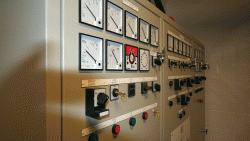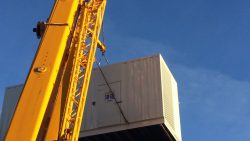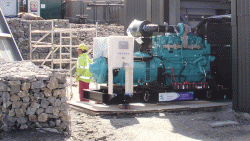Supply and installation of permanent onsite fuel polishing equipment for Kent based datacentres
The Generator Company has built a valuable and successful relationship with the end client over the past 10 years by supplying rental generators and carrying out maintenance and servicing on their standby generators both in the UK and Europe.
Due to engine failure caused by contaminated fuel at two of their Kent based sites, our generator engineers carried out fuel sampling that was followed by extensive fuel tank cleaning and fuel polishing, it was requested by the client that permanent fuel polishing equipment be should be fitted to all existing bulk fuel tanks at these sites to ensure regular cleaning for the long term storage of the fuel.
At the request of the end client a site visit was made by our Director of Special Projects to discuss and determine which equipment would be adequate, taking into account the duration of polishing and the levels of monitoring required.
Following these site visits and subsequent discussions with our in house project team, the following proposal was offered:-
Site 1:- To maximise the cost effectiveness of the installation we proposed to supply and install two fuel polishers at Site 1.
A single fuel polishing unit to service both HD bulk fuel tanks and a further single fuel polishing unit to service both LD bulk fuel tanks. Both of the proposed fuel polishers would be controlled by motorised valves on both the inlet and outlet pipe work and a suitable timer allowing the units to changeover between the two tanks on a pre-programmed date and time basis, manual intervention is also available if required to change between tanks before the scheduled date and time.
Site 2:- To maximise the cost effectiveness of the installation for Site 2 we proposed to supply and install two fuel polishers.
A single fuel polishing unit to service both 16,000 litre bulk fuel tanks and a further single fuel polishing unit to service the proposed new 30,000 bulk fuel tank. The polisher feeding the two 16,000 litre bulk fuel tanks would be controlled by motorised valves on both the inlet and outlet pipe work and a suitable timer allowing the units to changeover between the two tanks on a pre-programmed date and time basis, manual intervention is also available if required to change between tanks before the scheduled date and time. The fuel polisher for the single 30,000 litre bulk fuel tank would also have motorised valves for isolation purposes only and would also operate via a timer.
All polishers would be connected to their respective bulk fuel tanks via double skinned pipe work to provide leak detection facilities. The outer skin of each fuel pipe would be open at the fuel polisher end, allowing any contents to empty into the fuel polisher drip tray
therefore initialising a leak detection alarm and in turn initiating the motorised valves to shut and the fuel polisher to shut down, therefore limiting any further leakage. An alarm would also be raised both locally on the polisher and to the BMS.
Following agreement of the proposed works by both the client and end-client and issue of a purchase order, work could begin on the design of the polishers to suit the requirements of the site.
Prior to any works starting our dedicated Project Manager provided the client with all the necessary Health & Safety documentation including a Programme of Works, Risk Assessments and Method Statement and COSHH Assessments.
On the agreed start date, and in accordance with the previously agreed programme, the fuel polishers were delivered to the first of the two sites using our own Hiab lorry and offloaded by our competent Hiab operative to ground level. The fuel polishers were then placed into their final position using a 2000kg pallet truck.
New internal pipe work for the proposed fuel polishing equipment had already been fitted during the tank cleaning operations as it proved to be cost effective to undertake the installation of the fuel polishing pipe work at the same time.
Once the tanks were in their final position the external pipework between the polisher and fuel tank was measured to determine the exact size. The pipes were then fabricated off site, returned and installed.
Once completed, the works on the second site were concluded as per Site 1.
All works were carried out in accordance with previously agreed documentation and design specifications over the course of 3 days per site to include installation, connections and final testing in accordance with the site requirements. The project was satisfactorily completed on time, with minimal interruptions to the live site and within the budget allocated.





